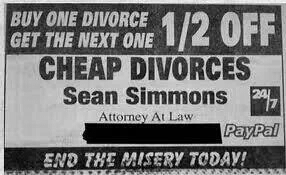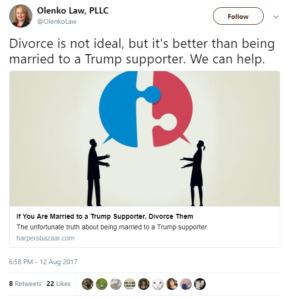- U.K.: Whole Earth 3 Nut Butter recalled for not displaying a “contains nuts” warning on the jar [Katie Morley, Telegraph]
- “Community College Reportedly Bans Pro-Second-Amendment Banner with Picture of Rifles” [Eugene Volokh]
- More on the dubious “hate crimes have surged” narrative, from Will Reilly of Kentucky State, who has a new book out [Nolan Finley, Detroit News, earlier]
- In Lamps Plus v. Varela, Supreme Court rules courts should not read class arbitration mechanisms into arbitration agreements that do not explicitly provide for them [Morrison & Foerster; Joshua Dunlap, Pierce Atwood/JD Supra; Charlotte Garden, SCOTUSBlog] More: Federalist Society teleforum with Prof. Henry Allen Blair:
- “Judge tosses law firm’s suit seeking $9.75 million bonus fee in Chicago divorce case” [ABA Journal]
- Hot courtrooms and immigration judges: “A 10°F degree increase in case-day temperature reduces decisions favorable to the applicant by 6.55 percent. This is despite judgments being made indoors, ‘protected’ by climate control.” [Anthony Heyes and Soodeh Saberian via Tyler Cowen]
Posts Tagged ‘divorce’
“Writer’s ‘awful’ prenup experience actually shows value of lawyers, law prof says”
A prospective bride feels “miserable and unmoored” as her lawyer advises her to insist on negotiating a term of a pre-nuptial agreement proffered by her intended. Did the lawyer add or subtract value, or was it others’ fault? [Abby Mims, New York Times “Modern Love”; Steve Lubet, Legal Ethics Forum; Debra Cassens Weiss, ABA Journal]
October 4 roundup
- D.C. debates requiring employers that offer free employee parking to offer all other employees equivalent cash value [David Boaz, Cato]
- ADA frequent fliers in Gotham: “These handicapped New Yorkers are behind hundreds of lawsuits” [Melkorka Licea, New York Post]
- When should judges keep celebrity divorce records private? [Naomi Schaefer Riley, Acculturated, quotes me]
- “The Libertarian Lawyer Who Battled Jim Crow” [Damon Root on Moorfield Storey and Buchanan v. Warley]
- Antonin Scalia and legal education [Adam White, National Affairs]
- “Note to Texas, Florida: Insurance Fights Over Sandy Rage On” [David B. Caruso and Jennifer Peltz, Insurance Journal]
Great moments in lawyer marketing
This should qualify for some sort of prize for lawyer online marketing of questionable taste:
[original tweet, NYC-based Olenko Law Firm, linked Harper’s Bazaar article, my own Twitter response to latter]
March 18 roundup
- “The FAA Says You Can’t Post Drone Videos on YouTube” [Vice] Agency rethinking position following outcry? [Photography Is Not a Crime]
- Rep. Jackie Speier (D-Calif.) proposes bill directing Consumer Product Safety Commission (CPSC) to issue safety rules for detergent pods [Paula Bolyard, Heartland, quotes me; earlier] Bonus: Lenore Skenazy on CPSC zipper hooded sweatshirt recall;
- New Jersey high court — Gov. Christie’s appointees included — will now take over direct enforcement of court’s previous decisions (“Mount Laurel”) requiring towns to adopt low-income housing quotas [Bergen County Record, earlier]
- Bureau of Indian Affairs revises federal guidelines on Indian Child Welfare Act, and a nonprofit group of adoption attorneys says that not only were it and other stakeholder groups not consulted, but “entire sections” of the revision “completely disregard the best interest of children,” something ICWA alas encourages by its text [American Academy of Adoption Attorneys, earlier]
- Should winning class action plaintiff lawyers be able to mark up their expenses, such as photocopying, as two law professors propose? [Andrew Trask last year]
- “Attorney who appeared in more than 3,000 asbestos cases disbarred … ‘Excuse Man’ also loses license” [Chamber-backed Madison-St. Clair Record]
- If you see an online ad for $199 divorce, maybe think twice before giving them your debit card info over the phone [KTVK, Phoenix]
Next divorce half off
 Yes, this is a real, if tongue-in-cheek, ad by a Georgia lawyer. Via Huffington Post a year ago, though it dates back at least a year longer than that.
Yes, this is a real, if tongue-in-cheek, ad by a Georgia lawyer. Via Huffington Post a year ago, though it dates back at least a year longer than that.
Sometimes privacy wins out
A Utah lawyer has been stalled on his hopes of broadcasting divorce cases on YouTube [Salt Lake Tribune]
May 5 roundup
- Shakedowns as speech? “Patent trolls are getting First Amendment protection for their demand letters” [ABA Journal]
- Kansas Rep. Tim Huelskamp decries press attention to $5K settlement over son’s bike mishap [Hutchinson News, more]
- NY Times covers story of copyright takedown on Marx-Engels works and mentions my Cato Institute post;
- After Pfizer’s attempt to expatriate itself for tax reasons, which other big companies with high overseas earnings might be next? [Washington Post]
- I’m quoted on rethinking of divorce law [Jennifer Hickey, Newsmax]
- Language Log quotes our post last year re: “La trahison des woncs”
- Shameless ad from UFCW, union that reps employees at Pennsylvania state stores, insists that grocery-store beer sales must be forbidden For the Children [PennLive, Tim Cavanaugh, Jacob Sullum; on factual controversy, MediaTrackers]
“Divorce Corp.”
Tracy Oppenheimer at Reason profiles a new reformist book and documentary on the costly business of divorce. “It’s the fourth most common cause of bankruptcy in the United States,” says filmmaker Joseph Sorge. Coverage: Paul Raeburn/Huffington Post, IMDb, Hollie McKay/Fox News, Nicolas Rapold/New York Times.
Could we undo the no-fault divorce revolution if we tried?
Megan McArdle has some thoughts on the role of changing divorce law among a broader shift of social mores and expectations on marriage, cohabitation, and childbearing in and out of wedlock.
Note, however, that reformers might take an interest in reconsidering the no-fault revolution from many motives other than a simple wish to discourage the rate of divorce across the board. (Contrary to some imaginings, critics of no-fault are a diverse crew, including social scientists, economists, lawyers and judges writing from secular, liberal, and classical-liberal as well as religious-conservative standpoints.) Some see no-fault as deficient in fairness in deciding between the claims of offending and innocent spouses. Some worry that it results in a first-mover advantage in favor of whichever spouse initiates the unraveling of a marriage (by removing assets, for example) and that such an advantage might have destructive effects if not corrected for in some way. And while (as McArdle argues) an expectation of marriage as being a hassle to leave might discourage entry into the institution, it is also possible that an expectation of it as being easily dissolved and lacking in real security might discourage entry by other persons.
“No-fault,” incidentally, may not be the most accurate term for the new system (“unilateral” would be more precise, sometimes combined with “relatively speedy”). While fault as such in contested cases may be kicked out the front door, it very often comes back in through the window in the form of arguments about parental fitness, appropriate asset division and other issues that are still open for argument in court.

